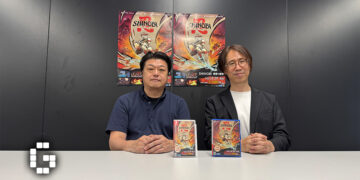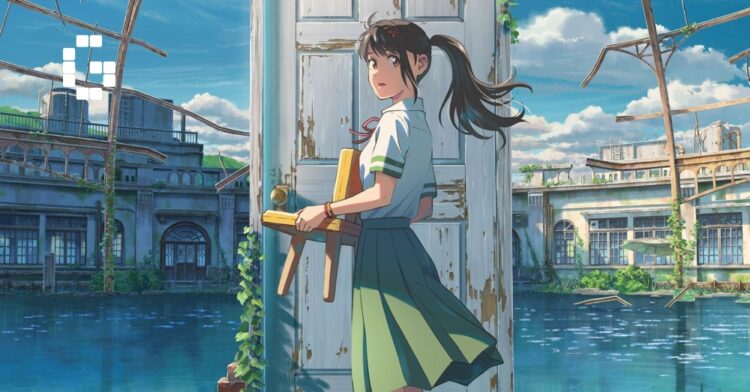Makoto Shinkai has certainly made a name for himself these past few years with the back-to-back hits of Your Name and Weathering With You, cementing his style of sublime animation, forbidden love stories, and magical realism. His latest picture Suzume certainly continues this idea but also sees him branching out a little more into action and higher fantasy.
Compared to Shinkai’s previous two films, Suzume is more experimental which some may find a bit confusing. One of the main characters spends the majority of the film as a talking chair and its meandering plot can come off as slightly messy but altogether the film definitely works. It uses its surreal concepts to craft an interesting coming-of-age story where even the smallest of side characters are memorable.
Door to Another World

Suzume Iwato (Nanoka Hara) is a high school girl living in a small town with her aunt Tsubame (Kana Hanazawa). One day she comes across a man traveling to some nearby “ruins” and follows only to see him attempting to force a reddish black creature from leaving a single standing door.
She soon learns that his name is Souta Munakata (Hokuto Matsumura) and it’s his job to close doors that house entities called Worms who can cause devastating earthquakes to ravage Japan. In order to stop this, they must find the keystone that secures the locks on the doors but Suzume accidentally undid the keystone before meeting Souta who has now morphed into a cat-like creature called Daijin (Ann Yamane). Daijin curses Souta binding his soul to an old children’s chair in Suzume’s room. Now the high schooler and the talking chair must journey throughout Japan to find Daijin and return the keystone.
Traveling Around Japan With My Chair
As you can tell from the plot summary, Suzume is a rather strange journey, being the story of a girl and a boy except the boy is stuck as a walking, talking three-legged chair. The film is a good mixture of high-octane action scenes chasing the cat and sealing the doors, and a more slow-paced comedic road trip movie, watching the odd couple travel across the country meeting eccentric personalities willing to help them get by.
This can be seen as a little too strange and messy at first. While the characters have solid goals the constant detours into the lives of side characters can feel a little out of place but it manages to come together. This is very much a movie about the journey rather than the destination and makes for some fun interactions to balance out the more dire plot points.
As with previous films, Shinkai is able to mix drama with a good sense of humor among the cast. Some of the best parts of the movie were watching the character just hang out with the different people they meet throughout their trip from a mother who works as a bar hostess to Souta’s college friend with a love of city funk music. There’s a strangely laid-back attitude to these scenes, creating a sense of nostalgia like meeting up with friends at a pub. You almost find yourself wishing that you could meet strangers that were this friendly.
I also have to say that the main hero being a chair is not only hilarious but leads to some really creative scenes. The comedy of a chair running down the street, having to keep him secret, or the fact that he actually falls over whenever he sleeps leads to some great physical humor. Yet it also works for the more dramatic elements. Something about this tiny frail chair charging at giant monsters and mischievous cat spirits makes the situation seem all the more intimidating.
Suzume in Suzume

This is where Suzume shows a more creative approach to storytelling: Suzume herself. She’s your typical high school girl, kind, and energetic but also feeling a little smothered by her aunt who acts as her guardian, and not knowing the full story of what happened to her mother.
While not the most original of character arcs it is executed well. Unlike the previous two Shinkai movies where the main couple gets equal billing, Suzume is very much the main character with Souta playing a major but ultimately supporting role to the point where you can argue the film is a character study of Suzume.
A lot of the film is based around her going out and seeing the world, learning from the different people she encounters, and growing from their different views on life. It’s a solid coming-of-age story that makes her enjoyable as the protagonist and as I mentioned before, it’s just cool watching her play off the various personality of the supporting cast that really give her a chance to shine.
It also allows Shinkai to tackle the romance elements in a different fashion. As Souta spends most of his time as a chair, the film instead explores why it is Suzume falls in love with him, this man she just met. She seems to be attracted to him at first sight however as the film goes on, and we learn more about the both of them, her resolve to be with him strengthens beyond that.
Shouta
You may have noticed by I really like the cast of Suzume with the majority of them making a memorable bunch.

Our main hero Souta was instantly turning heads among friends of mine for how much he looked like Howl from Howl’s Moving Castle. Sadly for them, he spends most of the movie in chair form. While this means we won’t get to see a lot of his good looks, we do get to see a good force of emotions come out of him.
Despite only having two carved-out wooden eyes to emote with, VA Hokuto Matsumura squeezes so much personality into the chair. Alongside the superb camera angles and shot timing, you can almost always understand what he’s thinking and sympathize with the guy. That feeling of being stuck in a stiff, expressionless hunk of wood slowly drifting away from your human senses. And as I said before, the comedy done with Mr. Chair makes it all worth it on his own.
The other character I want to highlight is Suzume’s aunt and guardian Tsubame. In a medium dominated by high-schooler protagonists, it’s always cool to see an anime look at the issues of adults and older adults at that. Tsubame is a woman in her early 40s, she’s overworked, doesn’t have much of a social life, and has to take care of her increasingly rebellious niece. Despite this, though you sense the familial love she has for Suzume, and by the climax, I found her just as relatable and nuanced.
Finally, there is our main antagonist Daijin. I can’t say much without spoiling anything but this little guy is up there with Kyubey for cat-like things that are both adorable and incredibly menacing at the same time.
Shinkai’s Action Animation

Of course, we can’t end a review of a Shinkai movie without talking about his studio’s god-like animation. The beautiful azure sky and high-quality shots of Japanese cities and infrastructure are as great as ever.
The best part of this film is the high stakes, we see Shinkai take on more action scenes in the movie which in term makes his animation style stand out even more. The fast-paced rush as Suzume and Souta attempting to seal the doors makes for the flood of darker colors spearing across a multiplied of different areas from amusement parks to abandoned schools and each looks wonderful. It really feels like Shinkai has reached a point where he truly has no budget and can put whatever he wishes on screen through the power of animation.
Opening The Door

Suzume is another win in the belt of Makoto Shinkai but also shows the that director is not resting on his laurels. The movie still makes use of themes like forbidden romance and coming of age that Shinkai likes to implement into his works but also sees them evolve in new genres and concepts.
Not everyone will appreciate the messy girl-and-chair road trip seen throughout Suzume but I very much enjoyed the ride. Suzume makes for a relatable and fun main character with a lot of nuances in her backstory and relationships that change as the film goes on. The side characters likewise have a lot of charm and are given how to develop naturally. The willingness to experiment is also seen in the action scenes where Shinkai takes his gorgeous production value to the true next level.
Overall, Suzume lives up to its forebearers and in some ways surpasses them. I personally don’t like it quite as much as Your Name but it’s also not trying to be like Your Name, it’s paving its own way and inviting you to step through the door and journey alongside it.
Suzume is now screening across Malaysia
Join Us!
We are recruiting! If you want to break into the gaming media industry, don't miss out on the golden opportunity. Find out more: Malaysia. Overseas.The Review
PROS
- Storytelling is experimental and creative
- Suzume is a relatable and well developed character
- The production value is as high quality as ever
CONS
- Some may find a the story a little too confusing or strange








![[EXCLUSIVE] Wan Hazmer Reveals How No Straight Roads 2 Expands Beyond Vinyl City with Shueisha Games](https://cdn.gamerbraves.com/2025/06/NSR2_Interview_FI-360x180.jpg)




![[EXCLUSIVE] Inside Japan’s Indie Game Revolution – An Interview with BitSummit Organizer Masahiko Murakami](https://cdn.gamerbraves.com/2025/05/BitSummit-Orgainzer_Interview_FI-360x180.jpg)
![[EXCLUSIVE] The Art of Adaptation: Developer Interview Details the OVERLORD Mobile RPG Lord of Nazarick](https://cdn.gamerbraves.com/2025/05/Lord-of-Nazarick_Interview_FI-360x180.jpg)
![[EXCLUSIVE] Taking Gundam in Bold New Directions – Interview with GQuuuuuuX Director Kazuya Tsurumaki](https://cdn.gamerbraves.com/2025/04/Kazuya-Tsurumaki_Interview_FI-1-360x180.jpg)










![[GUIDE] Etheria: Restart Codes & How To Redeem Them](https://cdn.gamerbraves.com/2025/06/GamerBraves_FeatureImageTemplate-Etheria-Restart-Code-Redeeming-360x180.jpg)
![[GUIDE] Zenless Zone Zero 2.0 – Yixuan: Master the New Rupture Specialist](https://cdn.gamerbraves.com/2025/06/ZZZ-2.0-Yixuan_Guide_FI-360x180.jpg)
![[GUIDE] Zenless Zone Zero 2.0 – Pan Yinhu: The Cuddly Tank That Packs a Punch](https://cdn.gamerbraves.com/2025/06/ZZZ-2.0-Pan-Yinhu_Guide_FI-360x180.jpg)
![[GUIDE] Zenless Zone Zero 2.0 – Pull Recommendations](https://cdn.gamerbraves.com/2025/06/ZZZ-2.0-Pull-Recommendations_Guide_FI-360x180.jpg)
![[GUIDE] Polychrome Farming in Zenless Zone Zero Version 2.0](https://cdn.gamerbraves.com/2025/06/ZZZ-2.0-Polychrome-Farming_Guide_FI-1-360x180.jpg)